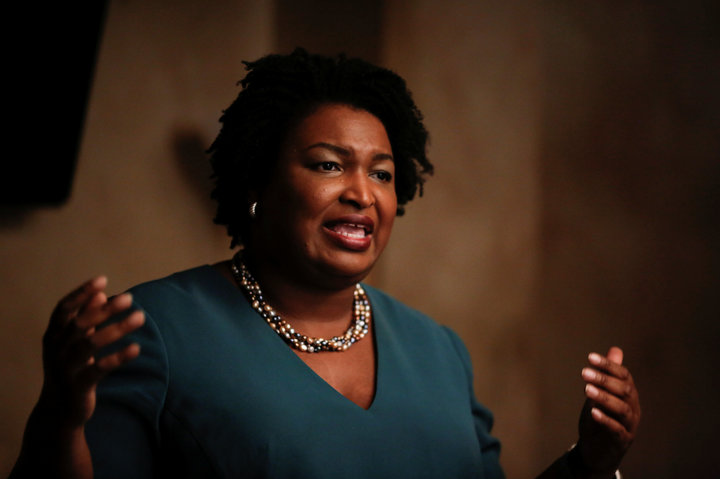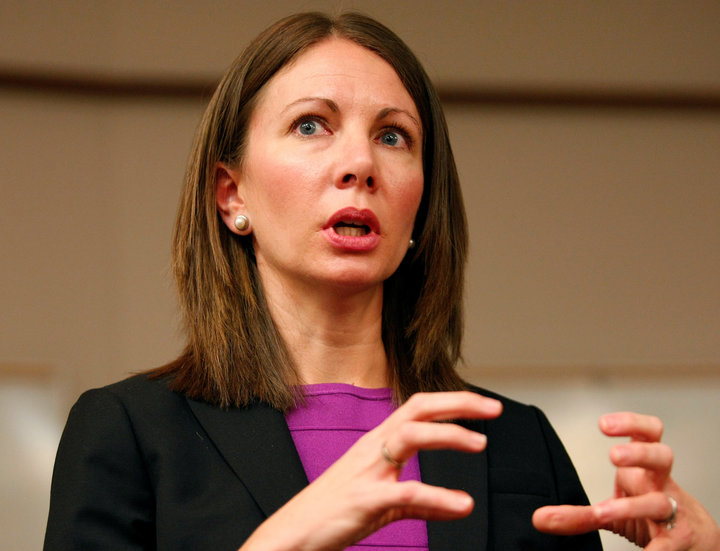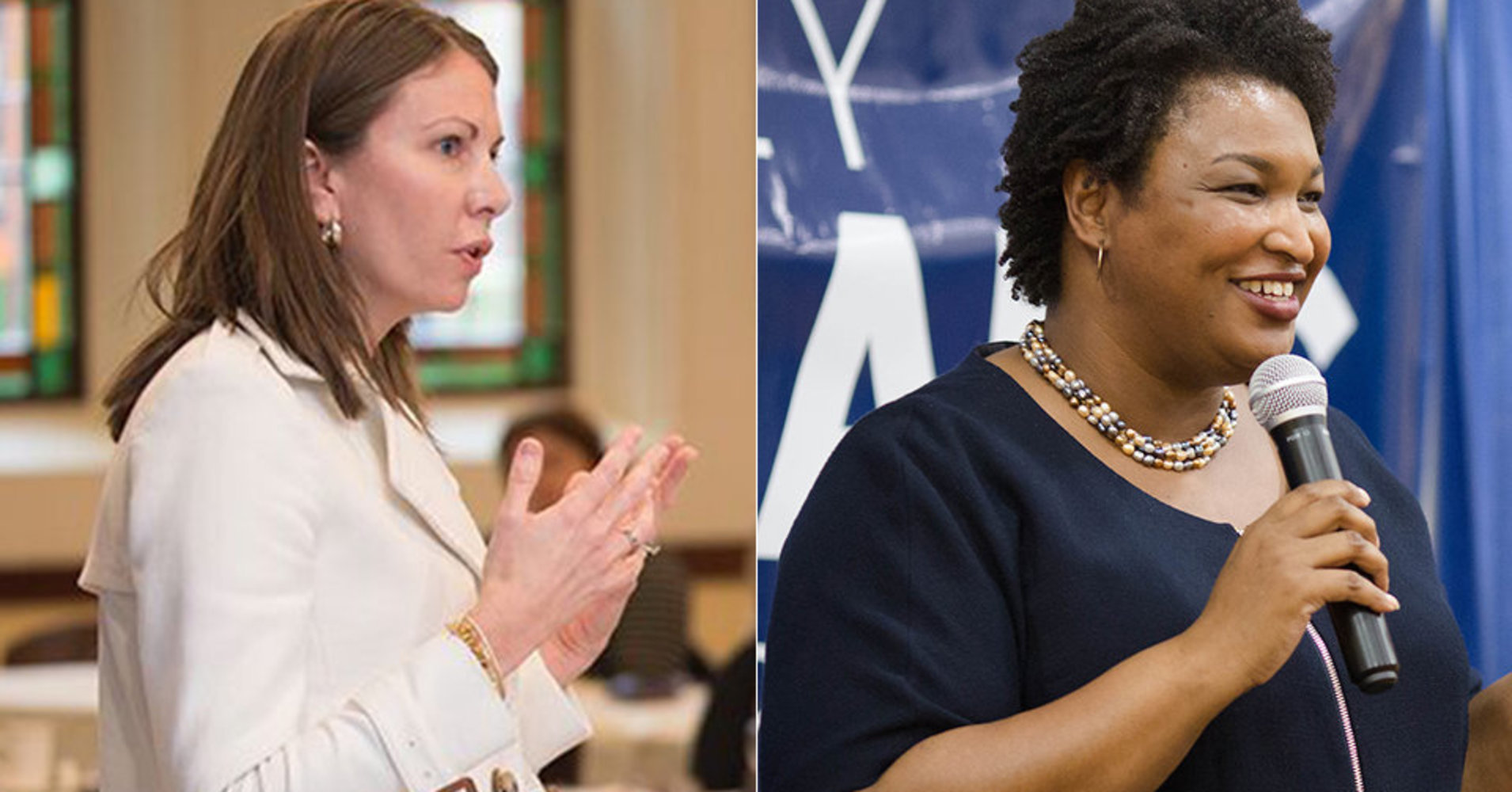[ad_1]
Should Democrats nominate a candidate based on their record of standing up for progressive values, or their vision for the future?
And should the party court white moderates to implement that vision, or expand the electorate by exciting millennials and voters of color who don’t regularly show up to the polls?
Those are the questions at the heart of Tuesday’s Democratic primary for governor of Georgia.
Stacey Abrams, the former Georgia House minority leader and the odds-on favorite in the race, is running on a solidly progressive platform and the premise that Democrats do not need to cater to the largely white “swing” voters who have abandoned the party in droves.
Stacey Evans, a former colleague of Abrams’ in the House, is running on ever-so-slightly more moderate policies aimed at capturing just enough Republicans and independents to win. At the same time, Evans has argued that on several key bills, Abrams was too willing to compromise with Republicans, especially in a high-profile 2011 vote to cut the state’s free public college program.
If elected in November, either candidate would be the first woman to govern Georgia. But Abrams’ election would be more historic: She would be the first African-American female governor in the country.
A host of national liberal groups, Democratic Party leaders and donors have placed their bets with Abrams, whose voting rights work put her on the national map years ago.
If, as is likely, Abrams wins the primary, Democrats will have a rare opportunity to test the theory that a candidate of color at the top of the ballot and a turnout-the-base strategy can win in challenging territory. She would face an uphill climb, most likely against one of three deeply conservative Republicans: Lt. Gov. Casey Cagle, Secretary of State Brian Kemp or state Sen. Michael Williams.
As a result of the unique nature of Abrams’ candidacy, the national party would likely draw outsize lessons from her performance in the general election, whether that’s fair or not, according to Jeff Hauser, a veteran Democratic strategist who runs the Center for Economic and Policy Research’s Revolving Door Project.
“The stakes get a little magnified unfortunately when somebody is a historic candidate,” Hauser said. “People will be reading a little too much into the results one way or another, and that’s unfortunate, because white men don’t have to face that.”
What is truly radical about Abrams’ campaign is that she is running to the left to grow the base.
khalid kamau, South Fulton city councilman
The policy differences between Abrams, 44, and Evans, 40, are hard to spot. They both support raising the minimum wage, using Affordable Care Act funding to expand Medicaid and eliminating the use of cash bail.
However, the contrast becomes clearer in the two candidates’ framings of their respective bids.
Abrams, who founded the nonprofit New Georgia Project to register voters of color in 2014, has focused intensely on strengthening voting rights and expanding the electorate.
It’s a theme that Abrams drives home in a two-and-a-half-minute video advertisement that weaves together her parents’ struggles in Jim Crow Mississippi and her own career fighting for voting rights, starting as a 19-year-old speaker at the 1993 March on Washington.
“Your ability to participate in government, to improve your life, is contingent on your access to the ballot box,” Abrams states in the ad.
One of Abrams’ most vocal and generous supporters is Steve Phillips, a senior fellow at the Center for American Progress, and author of Brown Is the New White. Phillips argues that Democrats need no longer bother trying to win the votes of increasingly conservative white voters, when diverse candidates who embrace a civil rights agenda can successfully leverage the power of “the new American majority” ― progressive whites, Latinos, Asian Americans and black voters, especially black women.
Phillips is married to Susan Sandler, the daughter of two fabulously wealthy liberal donors, providing him with powerful backing to apply his political research.
PowerPAC Georgia, a PAC affiliated with Phillips’ nonprofit Democracy in Color, has spent $1.5 million on voter engagement to elect Abrams.
The outside cash provides Abrams an edge, even though both candidates’ campaigns had brought in about $2.3 million each as of the end of March. (Evans, who is wealthy from her work winning one of the largest Medicare fraud cases in U.S. history, self-funded most of her haul.)
And from his sizable perch on Twitter, Phillips has praised high-ranking Democrats for backing Abrams ― and lambasted others, including former Vice President Joe Biden, for failing to do so.
Biden aside, Abrams has rallied a truly impressive array of support from national Democratic Party leaders for her bid ranging from Sens. Kamala Harris (D-Calif.) and Cory Booker (D-N.J.) both of whom have stumped for her, to Sen. Bernie Sanders (I-Vt.) and Our Revolution, the progressive group that emerged out of his campaign. Abrams held a get-out-the-vote rally in Atlanta on Saturday where Ilyse Hogue, president of NARAL Pro-Choice America, and Valerie Jarrett, a former top adviser to then-President Barack Obama, both spoke.
Abrams’ supporters tend to speak about their enthusiasm for her in terms of the historic nature of her candidacy and the power it has to reshape politics in an increasingly purple state that is about one-third black.
“What is truly radical about Abrams’ campaign is that she is running to the left to grow the base,” said khalid kamau, a South Fulton city councilman who won his April 2017 race with the help of Our Revolution and the Democratic Socialists of America. (In accordance with the Yoruban African tradition, kamau spells his name with lowercase letters.)
“It will transform the state,” he added. “I don’t understand how anybody who lived through Barack Obama could not see that.”

For her part, Evans is wagering that the story of her rise from a childhood of rural poverty, and her subsequent fight to protect the HOPE scholarship have the power to both excite Democratic base voters as well as some moderates who don’t always back the party.
It is a more traditional playbook embodied by former Gov. Roy Barnes, one of Evans’ most prominent backers and the last Democrat to occupy the governor’s mansion in Georgia.
The watchword of Evans’ campaign is “hope,” which she employs liberally to describe both her overall mission for the state, and her commitment to HOPE, the free college program that secured her a place in the middle class.
The program is also the greatest point of contention between Abrams and Evans ― a symbol of what Evans claims is Abrams’ shallow commitment to the policies she professes to champion. In 2011, with the program facing a shortfall, Abrams voted for a bill signed by Republican Gov. Nathan Deal that dramatically scaled back the program.
Abrams argues that with a small minority in the legislature, her participation was essential to limiting the scope of the damage and ensuring that Deal held state pre-K funding harmless. But Evans and many state Senate Democrats thought that Democratic leaders could have held out for a better deal, and to some extent, that no deal at all was better than giving Republicans bipartisan cover for the legislation.
In a 30-second ad narrated by a college-bound black woman, Evans highlighted the disproportionate impact of the HOPE cuts on the state’s African-American residents, citing a statistic that 97 percent of African-American residents lost access to full scholarships as a result of the 2011 law’s higher grade and SAT requirements.
“As governor, I’ll fully restore HOPE scholarships ― for all our kids,” Evans concludes at the end of the ad.
Abrams, by contrast, has proposed something she calls “HOPE 2.0” that would make the program more needs-based, rather than merit-based.

Evans has also attacked Abrams for failing to disclose to her colleagues that her small business was the recipient of a state contract while she was negotiating with Deal. Abrams, who disclosed her ties to the company on official disclosure forms, maintains that her conduct has both legal and ethical, since she walled herself off from the company’s dealings with the state government.
In addition, Abrams has elicited scrutiny for a host of other votes, from a Republican-led gerrymandering bill about which she claims to have been misled, to legislation scaling back early voting, which she says provided financial relief to rural communities without restricting access to the ballot box.
The plausibility of Abrams’ explanations notwithstanding, her controversial record as a House Democratic leader has won her her fair share of critics, among whom are many of the state’s current and former African-American elected officials.
Abrams critics who have endorsed Evans include former state Senate minority whip Vincent Fort, and current state Reps. Ronnie Mabra, Dar’Shun Kendrick and Keisha Waites.
Atlanta Mayor Keisha Lance Bottoms (D) has not formally endorsed Evans, but she donated $1,000 through her campaign fund to the candidate.
Evans has her own share of less-than-progressive votes, including support for a bill making it easier for the state to take over troubled schools, and legislation that would have eased regulations on debt settlement companies that serve low-income borrowers. (The former became law; the latter went nowhere.)
But Evans does not portray herself as the most progressive candidate in the race, making her voting seem less out of step with her image. If she defies the odds and beats Abrams, it may be due to a sense among some voters that Abrams’ campaign-trail rhetoric simply doesn’t match her record.
“Abrams wanted to work both sides of the aisle and on some issues you just cannot do that,” said Isaac Hayes III, an Atlanta-based songwriter backing Evans.
[ad_2]
Source link

